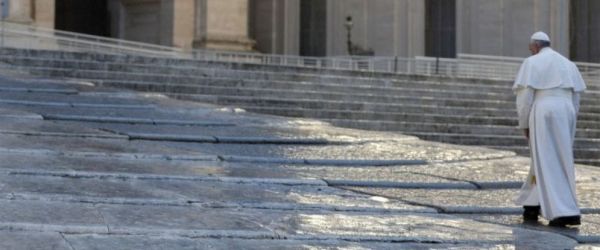In today’s Gospel Reading, the Solemnity of the Assumption of Mary Most Holy, the Holy Virgin prays with these words: “My soul magnifies the Lord, and my spirit rejoices in God my Saviour” (Lk 1:46-47). Let us look at the two verbs in this prayer: magnifies and rejoices. Two verbs: “magnifies” and “rejoices”. We rejoice when something so wonderful happens that it is not enough to rejoice within, in our soul, but rather we wish to express our happiness with our whole body: thus we rejoice. Mary rejoices because of God. Who knows whether we too have ever rejoiced for the Lord? We rejoice over a successful result and over good news, but today Mary teaches us to rejoice in God. Why? Because he — God — does “great things” (v. 49).
The other verb: to magnify refers to great things. “My soul magnifies”. To magnify. Indeed magnifying means to extol a reality for its greatness, for its beauty ... Mary exalts the Lord’s greatness; she praises him saying that he is truly great. It is important to seek great things in life; otherwise one becomes bemused by many trivialities. Mary shows us that in order to live a happy life, we should put God in first place because he alone is great. How many times instead, we are distracted by things of little value: prejudice, resentment, rivalry, envy, illusions, superfluous material goods.... How much pettiness there is in life! We know this. Today Mary invites us to raise our gaze to the “great things” that the Lord carried out in her. The Lord does many great things in us too, in each of us. We must recognize them and rejoice, magnify God for these great things.
Today we are celebrating the “great things”. Mary is assumed into heaven: small and humble, she is the first to receive the highest glory. She, a human creature, one of us, attains eternity in soul and body. And there she awaits us as a mother waits for her children to come home. Indeed the People of God invoke her as the Gate of Heaven. We are on a journey, pilgrims towards the home that is up there. Today we look to Mary and we see the finish line. We see that a creature was assumed into the Glory of the Risen Jesus Christ, and that creature could not have been but her, the Mother of the Saviour. We see that Mary, the new Eve, is in heaven, together with Christ, the New Adam; she is also there, and this gives us comfort and hope on our pilgrimage here below.
The feast of the Assumption of Mary is a call to each of us, especially those who are afflicted by doubt and sadness, and live with their gaze turned down, unable to raise their glance. Let us look up. Heaven is open. It does not inculcate fear. It is no longer distant because on the threshold of Heaven, a mother, our mother, is awaiting us. She loves us, she smiles at us and she thoughtfully assists us. Like every mother she wants the best for her children and she says to us: “You are precious in God’s eyes; you were not made for the small satisfactions of the world, but rather for the great joy of heaven”. Yes because God is joy, not boredom. God is joy. Let us allow Our Lady to take us by the hand. Each time that we hold the Rosary in our hands and pray to her, we are taking a step forward, towards the great destination of life.
Let us allow ourselves to be attracted by true beauty. Let us not be befuddled by the trivialities of life, but rather let us choose the greatness of Heaven. May the Holy Virgin, Gate of Heaven, help us daily to trustfully and joyfully look to where our true home is, where she is awaiting us like a mother.
[Pope Francis, Angelus 15 August 2019]












